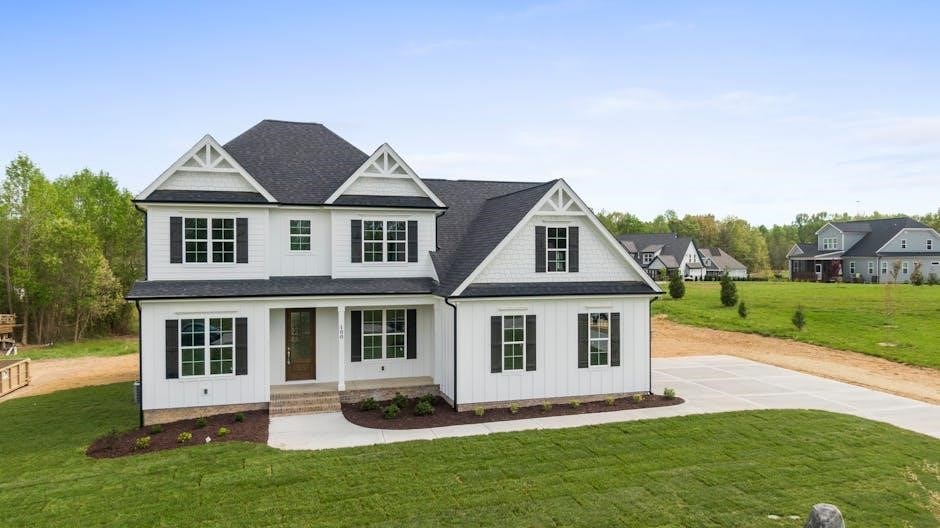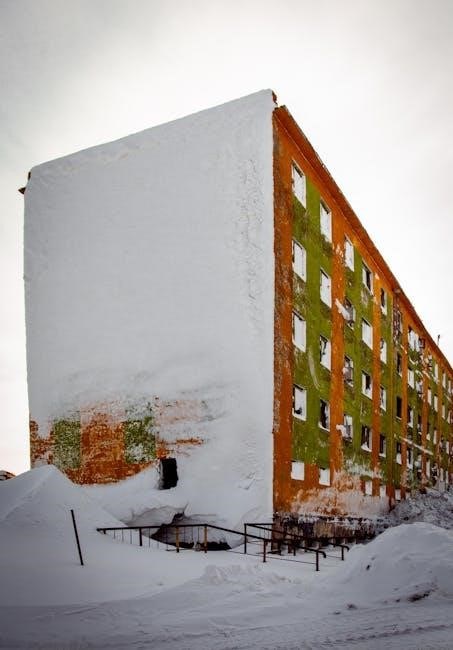The NC Building Code establishes standards for insulation to ensure safety‚ energy efficiency‚ and environmental sustainability in construction. It provides guidelines for various buildings‚ promoting sustainable practices.
1.1 Purpose of Insulation in Building Codes
Insulation in building codes serves to enhance energy efficiency‚ reduce thermal transfer‚ and maintain consistent indoor temperatures. It minimizes heat loss in winter and heat gain in summer‚ lowering energy consumption and costs. Proper insulation also improves structural integrity by protecting buildings from moisture and temperature extremes‚ reducing the risk of damage over time. Additionally‚ it plays a role in fire safety by slowing the spread of flames and providing noise reduction for a quieter living environment. By adhering to insulation standards‚ buildings become more sustainable‚ environmentally friendly‚ and comfortable. The NC Building Code outlines these requirements to ensure safe‚ energy-efficient‚ and durable construction practices across North Carolina.
1.2 Scope of the NC Building Code
The NC Building Code provides comprehensive guidelines for constructing safe‚ energy-efficient‚ and durable buildings across North Carolina. Its scope includes residential‚ commercial‚ and industrial structures‚ ensuring consistency in design‚ materials‚ and construction methods. The code addresses insulation‚ fire safety‚ accessibility‚ and environmental sustainability‚ tailored to the state’s climate zones. It applies to new constructions‚ renovations‚ and repairs‚ ensuring compliance with local conditions and building practices. Regular updates reflect advancements in technology and evolving safety standards‚ making it a dynamic framework for sustainable and resilient building environments.
1.3 Importance of Adhering to Insulation Standards
Adhering to insulation standards in the NC Building Code ensures energy efficiency‚ reduces utility costs‚ and enhances indoor air quality. Proper insulation minimizes heat loss in winter and heat gain in summer‚ lowering energy consumption and greenhouse gas emissions. It also protects against moisture damage and pests‚ extending a building’s lifespan. Compliance with these standards is crucial for meeting local regulations and obtaining necessary permits. Additionally‚ it supports public health by maintaining consistent temperatures and reducing mold growth. By following the code‚ builders contribute to a more sustainable and resilient built environment‚ benefiting both occupants and the community at large.

Overview of NC Building Code Insulation Requirements
The NC Building Code outlines specific insulation requirements to ensure energy efficiency‚ safety‚ and environmental sustainability in both residential and commercial constructions across North Carolina.
2.1 Key Areas Covered in the Code
The NC Building Code addresses insulation requirements for various building components‚ including walls‚ roofs‚ floors‚ and foundations. It also covers climate-specific standards‚ ensuring energy efficiency and structural integrity. The code outlines material specifications‚ installation methods‚ and compliance verification processes. Additionally‚ it provides guidelines for different building types‚ such as residential‚ commercial‚ and industrial structures. The code emphasizes the importance of insulation in reducing energy consumption and greenhouse gas emissions. It also ensures that buildings are adaptable to North Carolina’s diverse climate zones. By covering these key areas‚ the code promotes sustainable and safe construction practices statewide‚ aligning with both environmental and energy efficiency goals.

2.2 Historical Context and Updates
The NC Building Code has evolved over decades to reflect advancements in construction and energy efficiency. Originally based on the International Building Code‚ it was tailored to North Carolina’s climate and regulatory needs. Significant updates occurred in 2009‚ 2012‚ and 2018‚ focusing on energy conservation and environmental sustainability. The 2018 update introduced stricter insulation standards to align with federal energy guidelines. Recent revisions in 2021 further emphasized climate resilience and green building practices. These updates ensure the code remains relevant‚ addressing challenges like extreme weather and energy consumption. Historical revisions highlight the state’s commitment to modernizing building standards while preserving its unique environmental conditions. Each update reflects a balance between safety‚ efficiency‚ and environmental stewardship.

Specific Insulation Requirements in the NC Building Code
The NC Building Code specifies insulation requirements for residential‚ commercial‚ and industrial buildings‚ detailing materials‚ thickness‚ and installation standards across different climate zones to ensure compliance.
3.1 Insulation Requirements for Residential Buildings
The NC Building Code outlines specific insulation requirements for residential buildings to ensure energy efficiency and thermal performance. Walls‚ attics‚ floors‚ and foundations must meet minimum R-values‚ which vary by climate zone. In North Carolina‚ residential buildings typically fall under Climate Zone 3 or 4‚ requiring higher insulation levels in colder areas. Materials must comply with ASTM standards‚ and installation must prevent thermal bridging. Additionally‚ the code addresses air sealing to minimize heat loss. These requirements aim to reduce energy consumption while maintaining indoor comfort. Builders must adhere to these standards to ensure compliance and pass inspections. Proper insulation also contributes to long-term cost savings for homeowners.
3.2 Insulation Requirements for Commercial Buildings
The NC Building Code mandates specific insulation standards for commercial buildings to optimize energy performance and reduce operational costs. Walls‚ roofs‚ and foundations must meet designated R-values‚ varying by climate zone. Commercial structures in North Carolina typically require higher insulation levels due to the state’s diverse climate conditions. Continuous insulation is often mandated to minimize thermal bridging. Additionally‚ the code specifies requirements for windows‚ doors‚ and mechanical systems to ensure airtightness and thermal efficiency. Materials must comply with recognized standards‚ and installation must align with manufacturer guidelines. These regulations aim to lower energy consumption‚ reduce greenhouse gas emissions‚ and promote sustainable construction practices while ensuring occupant comfort and safety.
3.3 Insulation Requirements for Industrial Buildings
Industrial buildings in North Carolina must adhere to specific insulation requirements outlined in the NC Building Code to ensure energy efficiency and operational performance. These structures often have higher insulation demands due to their unique operational needs‚ such as high heat generation from machinery. The code specifies minimum R-values for walls‚ roofs‚ and foundations‚ tailored to industrial applications. Continuous insulation is frequently required to minimize thermal bridging and maintain consistent interior conditions. Additionally‚ industrial buildings may require specialized insulation for pipes‚ ducts‚ and equipment to reduce heat loss and improve process efficiency. Compliance with these standards ensures reduced energy consumption‚ lower operating costs‚ and alignment with environmental sustainability goals.
3.4 Climate Zone-Specific Insulation Requirements
The NC Building Code tailors insulation requirements to North Carolina’s climate zones‚ primarily Mixed-Humid and Hot-Humid climates. These zones influence insulation standards to address temperature fluctuations and humidity. In Mixed-Humid zones‚ insulation focuses on balancing heating and cooling needs‚ while Hot-Humid zones prioritize cooling efficiency and moisture control. Requirements vary for walls‚ roofs‚ and foundations‚ ensuring energy efficiency and comfort. The code specifies minimum R-values for each climate zone‚ adapting to regional conditions. This approach ensures buildings are optimized for local weather patterns‚ reducing energy consumption and maintaining indoor air quality. Compliance with climate-specific standards supports long-term sustainability and cost savings for building owners.
3.5 Material Standards for Insulation
The NC Building Code specifies material standards for insulation to ensure safety‚ durability‚ and energy efficiency. Materials must meet ASTM and ICC standards‚ with requirements for R-values‚ fire resistance‚ and moisture resistance. Common materials include fiberglass‚ cellulose‚ and spray foam insulation‚ each with specific applications. The code prohibits materials that do not meet these standards‚ ensuring reliability and performance. Compliance with material standards is critical for maintaining building integrity and achieving energy efficiency goals. These standards also address environmental concerns‚ promoting the use of sustainable and eco-friendly insulation options. Adhering to these guidelines ensures buildings meet both structural and environmental requirements.
Insulation Requirements for Different Building Components
The NC Building Code outlines specific insulation requirements for walls‚ roofs‚ floors‚ and foundations to ensure energy efficiency and structural integrity across all building types.
4.1 Wall Insulation Requirements
The NC Building Code specifies minimum R-values for wall insulation‚ varying by building type and climate zone. Residential walls typically require R-13 to R-20 insulation‚ while commercial walls may need R-15 to R-25. The code also addresses exterior wall insulation materials‚ such as fiberglass batts or rigid foam‚ ensuring proper installation and coverage. Additionally‚ it mandates continuous insulation in certain zones to meet energy efficiency standards. These requirements aim to reduce heat transfer‚ improve energy performance‚ and comply with national energy codes. Proper insulation installation is critical to meeting these standards and ensuring long-term building efficiency and cost savings.
4.2 Roof Insulation Requirements
The NC Building Code outlines specific requirements for roof insulation to enhance energy efficiency and reduce thermal transfer. Residential buildings typically require R-30 to R-38 insulation‚ while commercial buildings may need R-20 to R-30‚ depending on the climate zone. The code specifies acceptable materials‚ such as fiberglass batts‚ rigid foam‚ or spray foam‚ and mandates proper installation techniques. Continuous insulation is often required to meet energy efficiency standards. Additionally‚ the code addresses vapor barriers to prevent moisture issues. These requirements ensure that roofs effectively regulate temperature and minimize energy consumption. Compliance with these standards is crucial for both new constructions and renovations‚ promoting sustainable building practices and reducing environmental impact. Proper insulation installation is verified during inspections to ensure adherence to the code;
4.3 Floor Insulation Requirements
The NC Building Code sets forth specific requirements for floor insulation to improve energy efficiency and thermal comfort. For slab-on-grade floors‚ insulation is required at the perimeter‚ with R-values ranging from R-5 to R-10‚ depending on climate zones. Crawl spaces must have insulation installed on the exterior or interior of the foundation walls‚ typically R-10 in unheated areas. Heated spaces require higher R-values‚ such as R-19 for crawl space walls. The code also addresses insulation for radiant-heated floors‚ mandating continuous insulation to prevent heat loss. Acceptable materials include rigid foam‚ insulation boards‚ or batt insulation. Proper installation practices‚ such as sealing gaps and ensuring moisture protection‚ are emphasized. Compliance with these standards reduces energy consumption and enhances indoor environmental quality‚ aligning with sustainable building goals.

4.4 Foundation Insulation Requirements
The NC Building Code outlines specific requirements for foundation insulation to enhance energy efficiency and thermal performance. Insulation is mandatory for exterior foundation walls‚ footings‚ and slab edges in contact with the ground. The minimum R-value for foundation insulation ranges from R-5 to R-10‚ depending on the climate zone and building type. Continuous insulation is required for heated slabs‚ while unheated slabs may have reduced requirements. Acceptable materials include rigid foam insulation‚ insulation boards‚ or insulated concrete forms. Proper installation is critical‚ ensuring insulation extends below the frost penetration depth and maintains continuity at joints. These requirements help reduce heat loss‚ improve interior comfort‚ and align with overall energy conservation goals. Compliance is verified through inspections and documentation.

4.5 Insulation Requirements for Windows and Doors
The NC Building Code sets energy efficiency standards for windows and doors to minimize heat transfer and reduce energy consumption. Windows and doors must meet specific U-factor and Solar Heat Gain Coefficient (SHGC) requirements‚ ranging from 0.20 to 0.30 for U-factor and up to 0.40 for SHGC‚ depending on the building type and climate zone. Double-pane or triple-pane glass is typically mandatory‚ while single-pane windows are prohibited in most cases. Weatherstripping and tight seals are required to prevent air leakage. Additionally‚ windows and doors must meet air leakage standards‚ typically ≤0.3 cfm per square foot. These requirements ensure thermal performance‚ energy savings‚ and compliance with national energy codes. Proper installation and material selection are critical for meeting these standards.

Compliance and Inspection Processes
Compliance involves plan reviews‚ inspections‚ and verification of insulation installations. Regular inspections ensure adherence to code standards‚ promoting energy efficiency and safety. Proper documentation is required throughout.
5.1 Steps to Ensure Compliance with Insulation Requirements
To ensure compliance with NC Building Code insulation requirements‚ start by reviewing the code standards specific to your building type. Plan and design insulation installations according to these guidelines. Hire certified professionals to handle installations‚ ensuring materials meet specified standards. Conduct regular inspections during construction to verify compliance. Maintain detailed documentation‚ including material certifications and installation records. Schedule final inspections with local building authorities to obtain approvals. Address any discrepancies promptly to avoid delays. Training staff on code updates and best practices helps maintain ongoing compliance. By following these steps‚ you can ensure your project meets all insulation requirements efficiently and effectively.
5.2 Inspection Checklist for Insulation
An inspection checklist for insulation ensures all requirements are met. Verify insulation type and R-value match code specifications for walls‚ ceilings‚ and floors. Check installation methods‚ ensuring proper coverage and no gaps. Confirm materials comply with fire and safety standards. Inspect for damage or compression during installation. Verify insulation is continuous in areas like rim joists and knee walls. Ensure batt insulation is cut and fitted correctly around obstructions. Check blown-in insulation levels and distribution. Confirm insulation in unconditioned spaces meets requirements. Verify proper sealing of air leaks. Review documentation‚ including manufacturer specifications and installation certificates. Conduct a final visual inspection before approval. This checklist helps ensure compliance and optimal performance.
5.3 Penalties for Non-Compliance
Non-compliance with NC Building Code insulation requirements can result in penalties‚ including fines and project delays. Authorities may issue stop-work orders until violations are corrected. Repeat offenses may lead to higher penalties or legal action. Property owners or contractors found non-compliant may face financial repercussions. Inspections revealing substandard insulation could require costly rework. Additionally‚ failure to meet code standards may invalidate building permits or certificates of occupancy. Corrective actions must align with code specifications to avoid further penalties. Compliance is crucial to avoid legal and financial consequences. Ensuring proper insulation installation upfront is essential to prevent these outcomes. Penalties emphasize the importance of adhering to established standards for safety and efficiency.
Energy Efficiency and Insulation
Insulation plays a key role in enhancing energy efficiency by reducing heat transfer and energy consumption. The NC Building Code sets clear standards to guide proper insulation installation‚ ensuring energy savings and reduced greenhouse gas emissions while promoting sustainable building practices.
6.1 Role of Insulation in Energy Efficiency

Insulation is a critical component in achieving energy efficiency by minimizing heat transfer and reducing energy consumption. It prevents heat loss during winter and heat gain during summer‚ lowering the demand on heating and cooling systems. Proper insulation ensures consistent indoor temperatures‚ enhancing comfort while reducing energy costs. The NC Building Code emphasizes insulation’s role in creating energy-efficient buildings‚ aligning with broader sustainability goals. By adhering to these standards‚ buildings can significantly reduce their energy consumption and greenhouse gas emissions‚ contributing to a more environmentally friendly built environment.
6.2 Energy Efficiency Standards in the NC Building Code
The NC Building Code incorporates energy efficiency standards to minimize energy consumption while maintaining occupant comfort. These standards are based on the International Energy Conservation Code (IECC) and are tailored to North Carolina’s climate zones. They outline specific requirements for thermal performance‚ HVAC system efficiency‚ and building envelope design. Key elements include minimum R-values for insulation‚ U-factors for windows‚ and Solar Heat Gain Coefficients (SHGC) for fenestration. Compliance can be achieved through prescriptive or performance-based methods‚ ensuring flexibility for builders. By adhering to these standards‚ buildings reduce energy consumption‚ lower greenhouse gas emissions‚ and contribute to a more sustainable future. Regular updates ensure the code aligns with advancing technologies and environmental goals.
6.3 Incentives for Exceeding Insulation Requirements
Exceeding insulation requirements in the NC Building Code can yield significant benefits and incentives. Homeowners and builders may qualify for federal and state tax credits‚ rebates‚ and grants. Utility companies often offer rebates for energy-efficient construction. Additionally‚ local governments may provide property tax incentives for buildings that exceed code standards. Enhanced energy efficiency can also lead to lower utility bills and increased property value. Recognition programs‚ such as ENERGY STAR certification‚ can further boost marketability. These incentives encourage builders to adopt advanced insulation practices‚ contributing to a more sustainable and energy-efficient built environment. By exceeding requirements‚ stakeholders can benefit financially while supporting environmental goals.
Environmental Impact of Insulation Requirements
The NC Building Code’s insulation requirements aim to reduce energy consumption and greenhouse gas emissions‚ promoting sustainable construction and minimizing environmental impact through efficient practices.
7.1 Reduction of Greenhouse Gas Emissions
Insulation requirements in the NC Building Code play a crucial role in reducing greenhouse gas emissions by minimizing energy consumption. Proper insulation decreases the need for heating and cooling‚ which are significant contributors to carbon emissions. By adhering to these standards‚ buildings become more energy-efficient‚ lowering their environmental footprint. The code ensures that construction practices align with sustainability goals‚ promoting the use of materials and techniques that reduce energy consumption. This not only helps combat climate change but also supports North Carolina’s broader environmental objectives. The emphasis on insulation is a key strategy for achieving long-term reductions in greenhouse gas emissions while fostering sustainable development.
7.2 Promotion of Sustainable Building Practices
The NC Building Code insulation requirements actively promote sustainable building practices by ensuring energy efficiency and reducing environmental impact. By specifying minimum insulation standards‚ the code encourages the use of materials and techniques that minimize energy consumption. This not only lowers greenhouse gas emissions but also supports the broader goal of sustainable development. The code aligns with environmental standards‚ promoting the use of recycled and locally sourced materials. Additionally‚ it addresses moisture control and air sealing‚ which are critical for long-term building durability. Compliance with these requirements helps builders and architects achieve certification under programs like ENERGY STAR or LEED‚ further advancing sustainable construction practices statewide. This approach ensures that buildings are not only energy-efficient but also environmentally responsible.
7.3 Impact on Indoor Air Quality
The NC Building Code insulation requirements play a significant role in improving indoor air quality by reducing moisture infiltration and preventing the growth of mold and mildew. Proper insulation ensures that outdoor pollutants‚ allergens‚ and humidity are less likely to enter the building envelope‚ creating a healthier indoor environment. Additionally‚ insulation helps maintain consistent temperatures‚ which can reduce the need for heating and cooling systems that may circulate airborne contaminants. By sealing gaps and cracks‚ insulation also minimizes the entry of radon and other soil gases‚ further enhancing indoor air quality. These standards not only promote energy efficiency but also contribute to the overall health and comfort of occupants‚ making buildings safer and more livable.

Resources and References
Official NC Building Code publications and online portals provide detailed insulation guidelines‚ ensuring access to updated standards and compliance requirements for construction projects statewide.

8.1 NC Building Code Insulation Requirements PDF
The official NC Building Code Insulation Requirements PDF is a comprehensive document outlining the state’s insulation standards. It provides detailed guidelines for residential‚ commercial‚ and industrial buildings‚ ensuring compliance with energy efficiency and safety regulations. The PDF includes specific requirements for walls‚ roofs‚ floors‚ and foundations‚ as well as climate-zone specific insulation standards. It also covers approved materials and installation methods. This resource is essential for architects‚ contractors‚ and builders to ensure projects meet legal and environmental standards. Regularly updated‚ the PDF reflects the latest advancements in building science and sustainability practices; It serves as a primary reference for understanding and implementing insulation requirements effectively.
8.2 Additional Resources for Building Insulation
Beyond the NC Building Code Insulation Requirements PDF‚ numerous additional resources are available to guide building insulation practices. Online platforms offer detailed guides‚ checklists‚ and tools to help professionals comply with regulations. Workshops and webinars conducted by industry experts provide hands-on training and updates on the latest standards. Case studies and white papers from reputable organizations share real-world applications and best practices. Additionally‚ professional forums and associations‚ such as ASHRAE and the Insulation Contractors Association of America‚ offer valuable insights and networking opportunities. These resources empower architects‚ contractors‚ and builders to stay informed and implement efficient insulation strategies‚ ensuring both compliance and optimal performance in their projects.
8.3 Contact Information for NC Building Code Authorities
For inquiries or clarification on the NC Building Code insulation requirements‚ contact the North Carolina Department of Insurance‚ Office of State Fire Marshal. Their office is located at 1202 Mail Service Center‚ Raleigh‚ NC 27699-1202. You can reach them by phone at (919) 647-0001 or via email at osfm@ncdoi.gov. Visit their official website at www.ncdoi.com for detailed resources and updates. Regional offices are also available to assist with local-specific questions. Office hours are typically Monday through Friday‚ 8:00 AM to 5:00 PM EST. Ensure to verify contact details before reaching out‚ as information may be subject to change.

